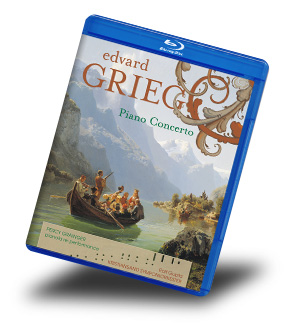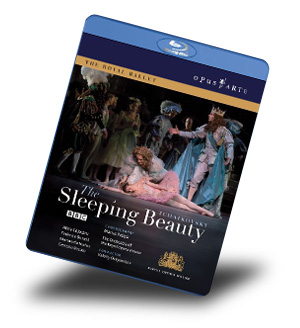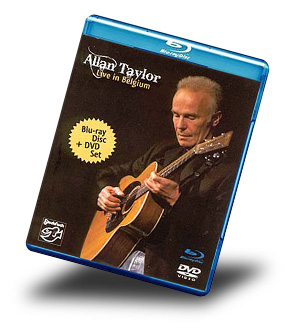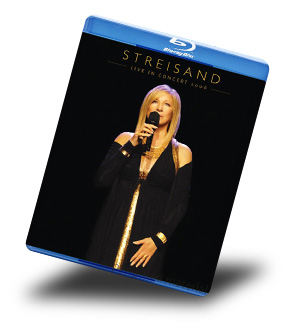 November 2009
Video or Not, Blu-ray Is Just
Right for Music Too
 It seems certain that Blu-ray is
here to stay and will eventually replace DVD as the medium for movies. And though
it's somewhat unlikely, it could also replace CD, SACD, and DVD-Audio for music. A number
of recently released Blu-rays prove that the sound formats and mixes Blu-ray allows
cover all the bases, and a few companies have released audio-only Blu-rays. It seems certain that Blu-ray is
here to stay and will eventually replace DVD as the medium for movies. And though
it's somewhat unlikely, it could also replace CD, SACD, and DVD-Audio for music. A number
of recently released Blu-rays prove that the sound formats and mixes Blu-ray allows
cover all the bases, and a few companies have released audio-only Blu-rays.
Morten Lindberg
and his 2L label have been at the forefront of issuing music-only
discs on Blu-ray, and the latest marries cutting-edge technology with the best that
1921 had to offer. The composition is Edvard Grieg's much-loved piano concerto,
performed by Kristiansand Symfoniorkester and conducted by Rolf
Gupta (2L 60 Blu-ray/SACD, ****). The soloist, via Duo-Art music rolls
from 1921, is Percy Grainger, who passed away in 1961.
Music rolls that played mechanically on specially equipped
pianos were much more sophisticated than 21st-century listeners might imagine. Their
history is explained in greater detail in the program notes that accompany this disc, but,
in short, pianists could record not only notes but also tempos, dynamics, and
subtle gradations. The Grainger roll was digitized as orchestral parts transcribed to make
a solo piano version feasible were meticulously removed. The digital result was then set
down on a new roll for both recording purposes and live performances.
2L has, as usual, provided stunning engineering for
this historic event. The sessions were recorded in DXD at 24-bit/352.8kHz and transferred
to the Blu-ray in three different ways: 5.1 DTS-HD Master Audio
24-bit/192kHz, 7.1 DTS-HD Master Audio 24-bit/96kHz, and 2.0 LCPM
24-bit/192kHz. As far as I know, this is the first time 24-bit/192kHz has been used for a
multichannel recording. A number of DVD-Audio discs presented a 2.0 24-bit/192kHz option,
but space limited the number of channels, so this disc is also an example of how
Blu-ray’s copious space can be advantageous. The sound is smooth and rich, and
the piano impressed me with its realistic and natural timbre. The orchestra was
spread around to take advantage of the multichannel format, resulting in a recording
that is unusually transparent. Filling out the disc are some piano roll recordings
Grieg made in 1906 and Grieg’s third violin sonata with Øyvind
Bjorå as soloist. In case you don’t have Bu-ray yet (and this recording surely
makes a good case for getting it, even if you never watch video), there’s also
a hybrid multichannel SACD included that will play on all regular CD players and
provide stereo or multichannel sound on SACD players.
 Moving to audio and
video combinations, BBC’s Opus Arte label has released a large number of
opera and ballet recordings on Blu-ray that are quite splendid. The cost of a
ticket to a live performance has escalated, and you can now buy three or four Blu-rays for
the cost of a single ticket to a live performance. Home theater will never quite
eclipse live performances, but it can now be a grand alternative, allowing you
to see close-ups and angles that the live audience can’t experience and hear sound
that’s as good as most studio recordings. A good example
is Tchaikovsky’s The Sleeping Beauty (Opus
Arte Blu-ray BD7037 D, ****), danced and played by the forces of the
Royal Opera House. The music and story are known to most thanks to the Walt
Disney animated feature, though at 135 minutes this stage production uses all of
Tchaikovsky’s magnificent score instead of just snippets. The staging is the familiar
one, with the choreography of Marius Petipa and breathtaking dancing
by Alina Cojocaru and Federico Bonelli as the Princess Aurora and
Prince Florimund. Moving to audio and
video combinations, BBC’s Opus Arte label has released a large number of
opera and ballet recordings on Blu-ray that are quite splendid. The cost of a
ticket to a live performance has escalated, and you can now buy three or four Blu-rays for
the cost of a single ticket to a live performance. Home theater will never quite
eclipse live performances, but it can now be a grand alternative, allowing you
to see close-ups and angles that the live audience can’t experience and hear sound
that’s as good as most studio recordings. A good example
is Tchaikovsky’s The Sleeping Beauty (Opus
Arte Blu-ray BD7037 D, ****), danced and played by the forces of the
Royal Opera House. The music and story are known to most thanks to the Walt
Disney animated feature, though at 135 minutes this stage production uses all of
Tchaikovsky’s magnificent score instead of just snippets. The staging is the familiar
one, with the choreography of Marius Petipa and breathtaking dancing
by Alina Cojocaru and Federico Bonelli as the Princess Aurora and
Prince Florimund.
The picture is sharp, with good contrast and excellent
shadow detail. The colors are rich and varied, a long cry from Pioneer’s first
ballet Laserdiscs, which were marvels for their day but now seem as faded
as tintypes. The sound is a remarkable improvement as well. Those old lasers sounded
like pretty good FM radio, but this Blu-ray, presented in PCM 5.1 and 2.0, is as good
as a modern recording can be. Opus Arte has played around with different audio formats,
often using Dolby TrueHD, but it still employs multichannel and stereo PCM more often
than not. The result is a recording that offers great pleasure even without the picture,
and adding the video provides an altogether rewarding, if different,
experience. The soundstage is wide without a lot of depth, making the orchestra
sound just like a pit orchestra. In the 5.1 version, you get some bounce from the
hall as well as applause all around, and there’s also a
little dramatic thunder that’s panned around the hall.
 Allan Taylor: Live
in Belgium (Stockfisch Blu-ray, ****) is on a much more intimate
scale than the Tchaikovsky, and it shows how Blu-ray can be effective with quieter
sounds and venues. The concert filmed was presented in 2007, but I have no idea of
the exact size of the hall or audience -- the director must have felt, as I
often do, that shots of the hall and audience can be distracting, so there are none
here. My guess, based on the surround applause, is that it’s a
medium-sized hall with an audience of fewer than 500. Without the hall and
audience video, what you have is Taylor and his guitar against a black background,
shown in superb HD video with minimal editing. You get
different video perspectives of the soloist, including shots so close
that his head is deliberately cropped, but these perspectives change smoothly and
with reason. You won’t find any of the jerky and dizzying post-production editing
that plagues so many pop and rock concert videos. Taylor comes across well as a
folk singer who speaks directly to life experience, particularly in his encore, "Some
Dreams": Allan Taylor: Live
in Belgium (Stockfisch Blu-ray, ****) is on a much more intimate
scale than the Tchaikovsky, and it shows how Blu-ray can be effective with quieter
sounds and venues. The concert filmed was presented in 2007, but I have no idea of
the exact size of the hall or audience -- the director must have felt, as I
often do, that shots of the hall and audience can be distracting, so there are none
here. My guess, based on the surround applause, is that it’s a
medium-sized hall with an audience of fewer than 500. Without the hall and
audience video, what you have is Taylor and his guitar against a black background,
shown in superb HD video with minimal editing. You get
different video perspectives of the soloist, including shots so close
that his head is deliberately cropped, but these perspectives change smoothly and
with reason. You won’t find any of the jerky and dizzying post-production editing
that plagues so many pop and rock concert videos. Taylor comes across well as a
folk singer who speaks directly to life experience, particularly in his encore, "Some
Dreams":
Some dreams are big,
Some dreams are small.
Some dreams are carried away on the wind
And never dreamed at all.
Some dreams tell lies,
Some dreams come true.
I’ve got a whole lot of dreams
I can dream for you.
They’re simple thoughts, sung directly with
simplicity. Taylor’s voice sounds singularly natural, and it’s well
balanced with the guitar, which provides good support without being
overpowering. The guitar sound is clear throughout its range, and both voice and
guitar have excellent presence. There are three track options: 5.0 DTS-HD Master
Audio, 5.0 PCM, and 2.0 PCM. I’ve been curious about how effective Master
Audio might be for music, so I did a lot of A/B comparisons of the DTS and
PCM 5.0 tracks, and I could tell no difference. The PCM might have seemed a bit
warmer at first, until I realized that I knew that it was playing. If someone else had
given me a blind test, I’m sure I’d have been unable to tell the DTS from
the PCM. Both make for good audio-only listens, although Taylor’s tendency to
talk to the audience might leave some listeners longing for an image. But here again, this
disc proves the flexibility of Blu-ray as a disc that can be used, with equal
success, for audio or video.
 Barbra Streisand has been
described as a force of nature, and though she’s released many albums,
her powerful voice has been only adequately recorded. A new Blu-ray
disc, Streisand: Live in Concert 2006 (Live Nation Blu-ray,****) is the
best showcase of her show-stopping talent to date. Whether she’s belting or
crooning, the handheld wireless microphone catches every nuance in her delivery,
and the PCM multichannel and stereo (forget the Dolby Digital multichannel) is up to the
challenge. At an age when many are thinking of retirement homes, Streisand is totally
in command of her voice, and anything she does with it is no accident, as
she perfectly balances intelligence and passion in her singing. For this tour,
she picked a mix of old and new. You’ll hear a lot of favorites, such
as "People," "Evergreen," "Down With Love," and even
"Stoney End," along with new songs like "Unusual Way." One
of my favorites was a medley consisting of "You’ve Got to Be Carefully
Taught" and "Children Will Listen," a plea that we must be
tolerant in order to pass on that highly desirable attribute to children. Barbra Streisand has been
described as a force of nature, and though she’s released many albums,
her powerful voice has been only adequately recorded. A new Blu-ray
disc, Streisand: Live in Concert 2006 (Live Nation Blu-ray,****) is the
best showcase of her show-stopping talent to date. Whether she’s belting or
crooning, the handheld wireless microphone catches every nuance in her delivery,
and the PCM multichannel and stereo (forget the Dolby Digital multichannel) is up to the
challenge. At an age when many are thinking of retirement homes, Streisand is totally
in command of her voice, and anything she does with it is no accident, as
she perfectly balances intelligence and passion in her singing. For this tour,
she picked a mix of old and new. You’ll hear a lot of favorites, such
as "People," "Evergreen," "Down With Love," and even
"Stoney End," along with new songs like "Unusual Way." One
of my favorites was a medley consisting of "You’ve Got to Be Carefully
Taught" and "Children Will Listen," a plea that we must be
tolerant in order to pass on that highly desirable attribute to children.
The video is of very high quality.
It’s exceptionally detailed and smooth, both in close and long shots. Often
in DVD concerts there’s so much difference in focus between long and short views
that you almost feel dizzy, especially back when quick, rude editing was the norm. But
here the editing is entirely appropriate, and when a camera draws back for a
long shot, you don’t lose the feeling of HD. The audio, as mentioned, does
great justice to Streisand’s voice, but it’s also good to the
orchestra and guest artists Il Divo. The balances are just about perfect. Listen to the
opening music when the orchestra plays in near unison, and you can hear a well focused
bass and a xylophone many octaves higher with equal clarity. Again, this is
a video disc I could easily listen to without video thanks to the great
Blu-ray PCM tracks.
Thinking back to Laserdisc, audio for video has come a long
way in a very short time. Blu-ray can now offer audio that holds up without a picture, and
some producers have even chosen to go the audio-only route. Blu-ray is about much more
than just movies, but it’s a system that offers tremendous signal storage space,
and people with imagination will find new and wonderful ways to use it for both sight and
sound. Stay tuned.
. . . Rad Bennett
radb@soundstage.com
|

